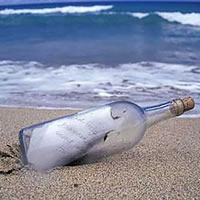A couple of years ago, I came across a treasure.
At least I think it was a treasure. Unfortunately, its real value I’ll never know.
What I found, while taking a break in my boat (I’m a sculler as well as a travel writer) was a bottle bobbing in the waves. I paddled over to it and saw what looked like milk inside.
But on closer inspection, I realized it wasn’t milk, it was a note, on which I could clearly see the penciled words “Open This.”
Carefully, I scooped it up into my shell and rowed back to the dock.
Once on shore, I painstakingly removed some heavy tape that had been wrapped around the bottle cap, to prevent water from seeping in. But a little water had gotten in and the paper was soggy.
I could see what appeared to be elaborate instructions on what to do should someone find this message.
Were these directions to some buried treasure? A cry for help from someone marooned in the Atlantic Ocean?
I’ll never know, because it was virtually impossible to decipher what was written.
We are all so focused on getting our content done and online these days, that few of us really take the time to make sure we’re archiving things the way we should so they’re not only available to us, but maybe our offspring or …down the road, some historians.
A friend of mine wrote the other day and said his back-up drive had crashed and he lost everything. It was the back-up drive. Repeat. The BACK-UP drive.
He had been smart. He had a back-up drive. But because of the crash, not only did he lose years of work, but his work (at least what was on that back-up drive) vanished from history.
I think establishing an electronic back-up system is just the first step in saving our work for the long-term. For the stuff we really treasure—and want to be treasured—we need to create a system to insure its survival. I know none of us really want to deal with having more paper around, but that might be one way to save it.
I’m not sure what the answer is, but I think it’s a topic that needs our attention. Wouldn’t that be like a pie in the face if everything we did digitally suddenly just disappeared?
~Susan
What steps do you take to ensure the long term survival of your work?






Interesting thought. I have several backups of my work on disks, stored not only in my own house, but also in my parents house. But if we suddenly didn’t have electricity anymore, I wouldn’t be able to recover any of it.
Maybe you’re right. Maybe it is handy to keep a hard copy of the most important things as well. I never actually thought of doing that, but it’s a good idea.
.-= Maria Staal´s last blog post: The Vikings In The Low Lands =-.
Very good point. How many back ups do we need to be safe. It is awful to loose all your work and something that I don’t pay enough attention to. You have given me the kick I need to get my stuff safely backed up. Thanks!
.-= Dave and Deb´s last blog post: Cinque Terre’s Five Villages Hike =-.
Thank you for this post. So much trust is placed in everything being recoverable, yet, like you said, it’s so easy to lose everything. I’ll be thinking of ways to save things in several formats and not relying on digital to always be there for me.
.-= Krista´s last blog post: Markets and Gazpacho Salad =-.
Besides being a good reminder for writers who rely on technology, this is actually a really beautiful post. I can’t imagine how exciting it must have been to find a message in a bottle, even if you couldn’t read it.
.-= JoAnna´s last blog post: Kaleidoscopic Wandering Turns One Year Old! =-.
I recently considered using a on-line backup system instead of an external hard drive, but your article makes me think twice. What if the company that had all my data were to suddenly close shop? The history of other companies, from Pan American Airlines to Prodigy, from NYC’s Tavern on the Green to Lehman Brothers, doesn’t give me confidence.